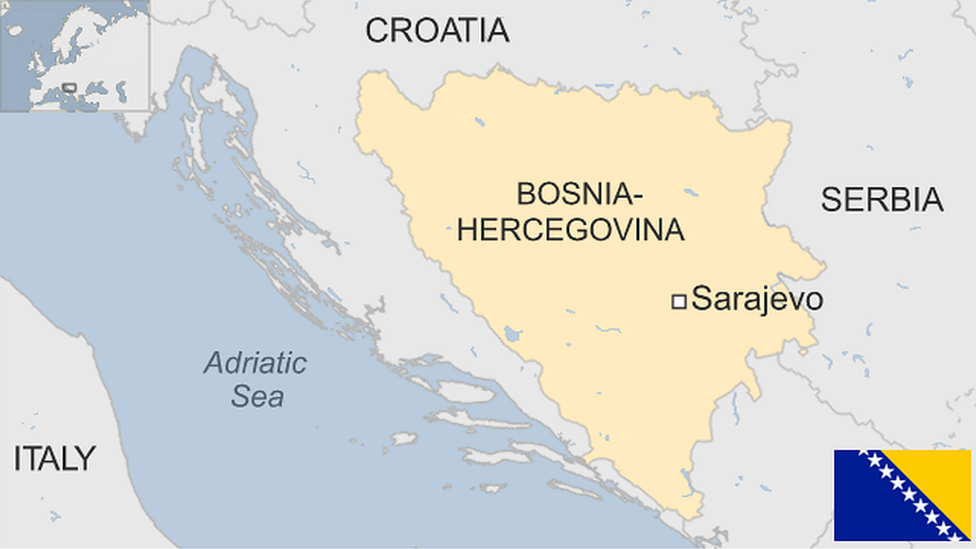Bosnian voices: Hopes from abroad
- Published
As the trials of Radovan Karadzic and Ratko Mladic continue, Bosnians around the world share their thoughts about what is needed to assist their country's continuing recovery from war.
People from Bosnia-Hercegovina, have been in contact with the BBC to express their thoughts on how to repair the nation, 20 years on, and what effect the quest for justice will have on such work.
Many have experienced the damage of the war of the 1990s first-hand, but some are the first generation to learn of what happened through parents and relatives. Some still live in the region but many now live abroad.
Boris Cigler, marketing professional, Amsterdam, the Netherlands
Growing up in war seemed normal, I didn't know any better. My mother fled Sarajevo with us (three children) while Dad stayed in the besieged city.
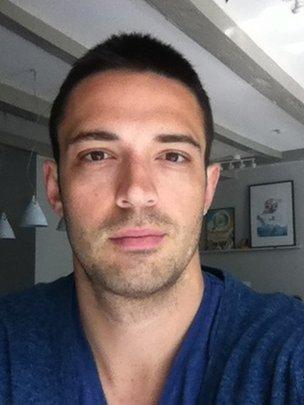
Boris hopes a more positive light can be shone on Bosnia and Hercegovina
All the world seems to care about when it comes to Bosnia-Hercegovina is war and war trials. But, war is our past.
The trials won't significantly change anything. Whatever the verdict is, one (or more) sides will see it as unfair and twist it to fortify their positions and prolong the state of ethnic conflict which is just translated from war to peace conditions.
People who were in the war couldn't care less, they're poor and barely living.
No work has ever been done on reconciliation. Every side has its history which is passed on to young generations. War criminals will always say it's not them on trial but their people - which is not true of course.
The ending of trials will have a somewhat positive effect in terms of less association of Bosnia-Hercegovina with the war, just as people will report less about Bosnia and Hercegovina in general. I guess it's a positive thing from a communication perspective.
My hopes for Bosnia-Hercegovina are that the international community will regain its focus on it, and among other things make it possible for the young diaspora (Bosnian and Hercegovina people living abroad, now amounting to a third of the nation) to participate more in the country's processes, to make it possible for these educated people to participate politically.
Sanela Gurdic, supermarket supervisor, Oregon, USA
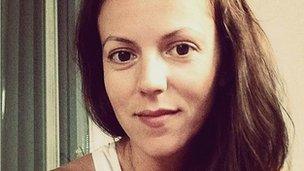
"The future of Bosnia does depend on the trials," says Sanela
I have been here in the States for 14 years and have gone home to Bosnia a lot of times.
My hopes for Bosnia are for more secure jobs for the younger generation. While I was there I saw a lot of young, educated people and no jobs, no future plans for them. All they want to do is go somewhere else so they could work. The unemployment rate is very high in Bosnia and even the people that do work do not get paid on time. That is the biggest issue and we worry things will not change any time soon.
The future of Bosnia does depend on the trials for Karadzic and Mladic. The younger generation does not care much about the trials, but the older generation like my parents does. It would mean closure for many people, including myself. A lot of innocent men died during the war and those mothers who lost their husbands and sons could get closure after all.
Milijan Erbez, doctor of livestock production science and administration, Banja Luka, Bosnia-Hercegovina
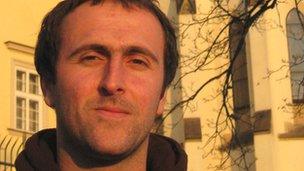
War was "tragic and full of violence on all sides", says Milijan
During the war I was a child. My family were lucky to get out. The war in Bosnia was tragic and full of violence on all sides. The world media is best acquainted with the suffering of the Bosniak (Bosnian Muslim) people, but does not show a great interest in the suffering of Serbs and Croats. Suffering appears unilateral, where the victims shown are almost exclusively Bosniaks and aggressors are Serbs or Croats.
Hatred is created in Bosnia and Hercegovina by those who attempt to impose the story that Bosniaks are the only victims.
In Sarajevo before 1992, there lived about 150,000 Serbs, and today there is no more than 8,000 Serbs. About 165,000 Christians (Serbs and Croats) who lived there before the 1990s do not live in Sarajevo today.
Before the massacre in Srebrenica, Muslim forces killed thousands of civilians, mostly Serbs in surrounding villages, in Kravica and the neighbouring municipality of Bratunac.
All victims deserve equal treatment and we owe it to them to find their remains and bury them with dignity. I'm glad this is happening with Bosniak victims, but it is very sad that thousands of Serb missing persons and victims do not interest anyone in Sarajevo or the international community. Those responsible for their murders remain free.
Atka Reid, writer and graphic designer, Auckland, New Zealand
My family and I lived in Sarajevo from the beginning of the siege in 1992. Sadly, we lost two members of our extended family.
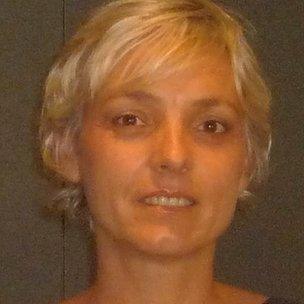
"Bosnians are resigned to the prospect of a very bleak future," says Atka
We go back to Bosnia as often as we can.
More than 20 years on, the main perpetrators of one of the longest-running sieges in modern history are still alive and have not yet been held to account for their crimes. People in Bosnia are still in survival mode and feel the horrific events have been brushed aside by the international community.
The International Criminal Court is a failure. Justice can only be served if the location and timing of the court are relevant to the case. As a result, the people of Bosnia have not seen any closure, and the Hague tribunal has become farcical, and Sarajevans and most Bosnians continue to live in a kind of psychological pressure cooker.
Bosnia is a country with two parliaments, with the federation split into cantons and Republika Srpska into regions, and of course Brcko as a separate district. So, on an administrative level Bosnia has ended up as a multi-headed monster. Bosnia cannot have a coherent economic and political future until the crimes of the past have been acknowledged by the perpetrators and judged both legally and morally.
Living under economic hardship and strict visa requirements imposed by the majority of other European countries, most Bosnians are resigned to the prospect of a very bleak future.
Danilo Gruban, student, Ghent, Belgium
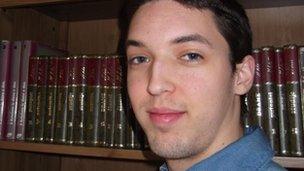
Danilo believes Bosnia's problems are more economic than political
I'm a student who has lived in Belgium all his life. I've seen the chaos and suffering the atrocities have created in the country of my parents' birth, Bosnia. Everyone has suffered from the war: Bosnians, Croatians, Serbians and others.
The main problem in Bosnia is still economic, rather than social or political. There are more people steadily willing to denounce the fear and hate for other ethnic groups; either because they are too young to remember the horrors of war, or old enough to recall how good relationships used to be.
People in general are starting to see how important it is to come together. Reaching the Fifa World Cup finals, for example, may seem like a trivial matter, but it has helped realise how we still have potential and talent.
I'm hoping that the trial coming to a conclusion will allow the ex-Yugoslavian people to leave this dark chapter of our history in the past. Spending so much time looking back at what happened, accusing and denying, we forget to look forward.
Interviewed and written by Richard Irvine-Brown
- Published24 March 2016
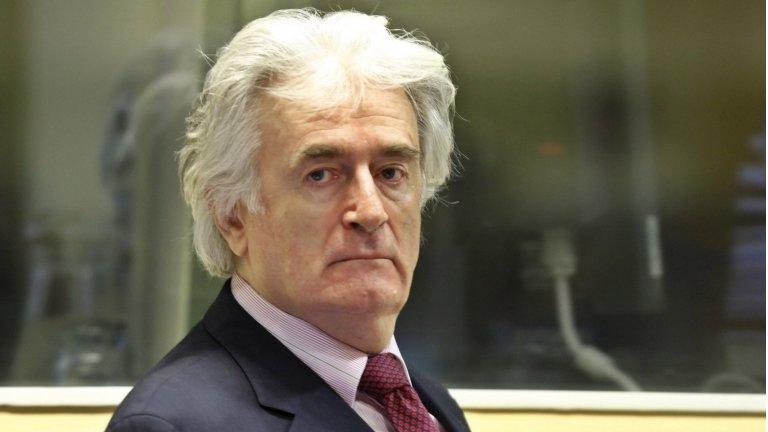
- Published22 November 2017
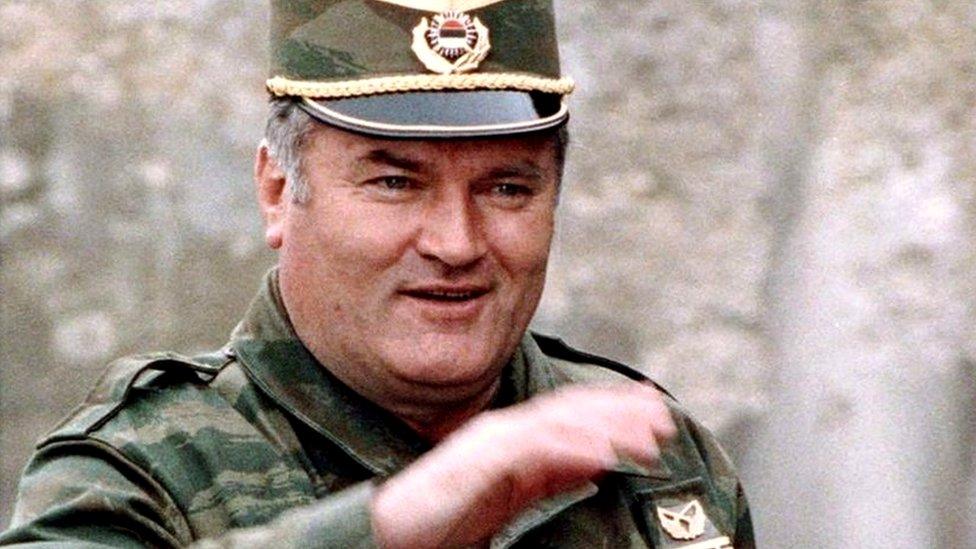
- Published7 February
